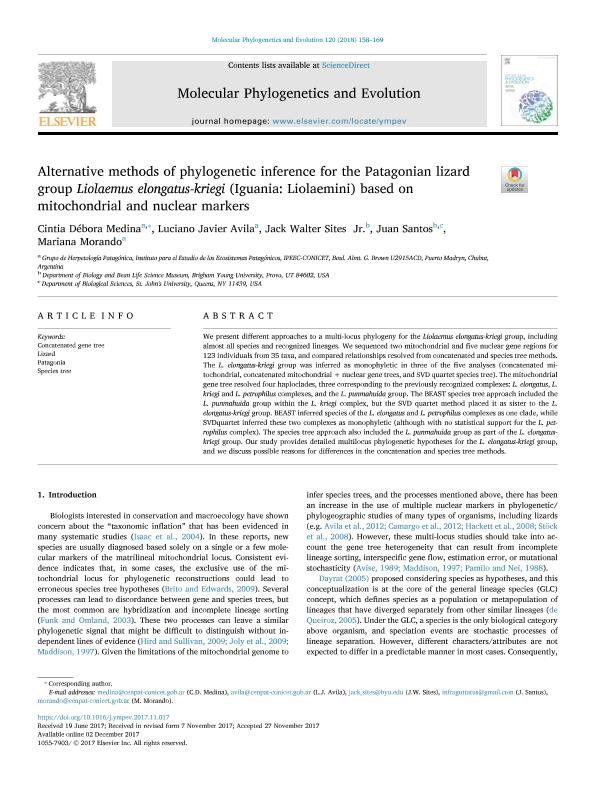Artículo
Alternative methods of phylogenetic inference for the Patagonian lizard group Liolaemus elongatus-kriegi (Iguania: Liolaemini) based on mitochondrial and nuclear markers
Medina, Cintia Débora ; Avila, Luciano Javier
; Avila, Luciano Javier ; Sites, Jack Walter Jr.; Santos, Juan; Morando, Mariana
; Sites, Jack Walter Jr.; Santos, Juan; Morando, Mariana
 ; Avila, Luciano Javier
; Avila, Luciano Javier ; Sites, Jack Walter Jr.; Santos, Juan; Morando, Mariana
; Sites, Jack Walter Jr.; Santos, Juan; Morando, Mariana
Fecha de publicación:
12/2017
Editorial:
Academic Press Inc Elsevier Science
Revista:
Molecular Phylogenetics and Evolution
ISSN:
1055-7903
Idioma:
Inglés
Tipo de recurso:
Artículo publicado
Clasificación temática:
Resumen
We present different approaches to a multi-locus phylogeny for the Liolaemus elongatus-kriegi group, including almost all species and recognized lineages. We sequenced two mitochondrial and five nuclear gene regions for 123 individuals from 35 taxa, and compared relationships resolved from concatenated and species tree methods. The L. elongatus-kriegi group was inferred as monophyletic in three of the five analyses (concatenated mitochondrial, concatenated mitochondrial+nuclear genetrees, andSVDquartet speciestree). Themitochondrial gene tree resolved four haploclades, three corresponding to the previously recognized complexes: L. elongatus, L. kriegi and L. petrophilus complexes, and the L. punmahuida group. The BEAST species tree approach included the L. punmahuida group within the L. kriegi complex, but the SVD quartet method placed it as sister to the L. elongatus-kriegi group. BEAST inferred species of the L. elongatus and L. petrophilus complexes as one clade, while SVDquartet inferred these two complexes as monophyletic (although with no statistical support for the L. petrophilus complex). The species tree approach also included the L. punmahuida group as part of the L. elongatuskriegi group. Our study provides detailed multilocus phylogenetic hypotheses for the L. elongatus-kriegi group, and we discuss possible reasons for differences in the concatenation and species tree methods.<br /><br />
Palabras clave:
Concatenated Gene Tree
,
Lizard
,
Patagonia
,
Species Tree
Archivos asociados
Licencia
Identificadores
Colecciones
Articulos(IPEEC)
Articulos de INSTITUTO PATAGONICO PARA EL ESTUDIO DE LOS ECOSISTEMAS CONTINENTALES
Articulos de INSTITUTO PATAGONICO PARA EL ESTUDIO DE LOS ECOSISTEMAS CONTINENTALES
Citación
Medina, Cintia Débora; Avila, Luciano Javier; Sites, Jack Walter Jr.; Santos, Juan; Morando, Mariana; Alternative methods of phylogenetic inference for the Patagonian lizard group Liolaemus elongatus-kriegi (Iguania: Liolaemini) based on mitochondrial and nuclear markers; Academic Press Inc Elsevier Science; Molecular Phylogenetics and Evolution; 120; 2018; 12-2017; 158-169
Compartir
Altmétricas



